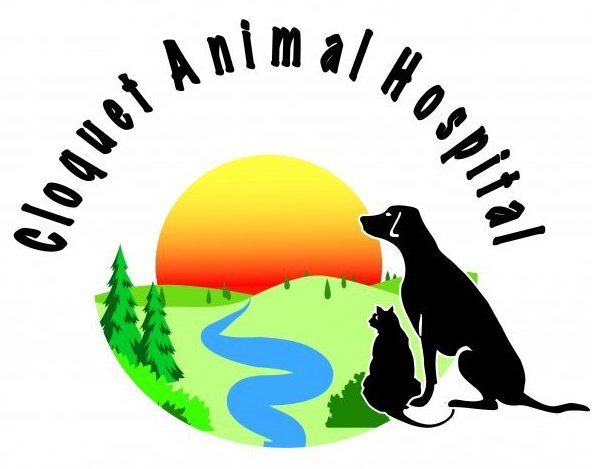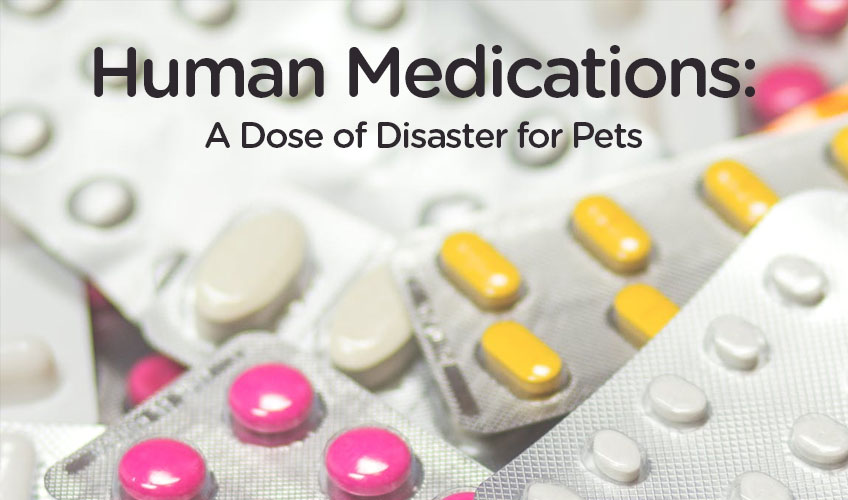Have you ever noticed a familiar name on a prescription written for your pet? Trazodone, Benadryl, and even Prozac are some of the many medications that can treat both humans and their furry pals. However, when a pet ingests a substance that isn’t prescribed, suggested, or supervised by a veterinarian, it can be very serious and even fatal.
One of the most common mistakes that pet parents make is administering medications designed and dosed specifically for humans. Other times, curious pets ingest prescriptions and over-the-counter drugs, often out of sight of their humans. Preventing your pet from accidental drug poisoning keeps your pet healthy and prevents an emergency trip to see us.
How Dangerous Is It for a Pet to Take Human Medications?
Depending on the medication and the dosage, your dog or cat can get extremely ill after ingesting a drug. This can lead to vomiting, disorientation, low blood pressure, kidney or liver failure, seizures, coma, and even death.
What Can You Do to Protect Your Pet from Accidental Poisoning?
First, learn the signs of poisoning in animals. Recognizing them early means you can quickly get treatment and possibly save your pet’s life. Some symptoms of drug poisoning in pets include:
- Weakness and disorientation
- Tremors and shaking muscles
- Increased urination
- Vomiting
- Drooling
- Extreme thirst
- Slowed breathing
- Lethargy
- Irregular heartbeat
- Pale gums and tongue
Second, know which medications are most harmful and most common for pet poisoning so you’re more aware when handling them. The typical culprits include:
- NSAIDs like Advil and Motrin
- Acetaminophens like Tylenol
- Sleep aids and benzodiazepines like Xanax and Ambien
- Antidepressants like Prozac, Lexapro, and Effexor
- ADD & ADHD medications like Adderall and Concerta
- Birth control
- Thyroid hormone medications
- Beta-blockers
- ACE Inhibitors
- Cholesterol medications
- Vitamin D
Third, always store medications out of reach of pets and in pet-proof packaging. Keep pet medicines separate from where you store ones for people to prevent accidentally switching medications.
Fourth, never try to treat your pet with over-the-counter or prescription drugs meant for humans without consulting a veterinarian first. Our pets have different metabolisms and reactions to medications than we do. If a website suggests using a medication meant for humans for your pet, don’t take their word for it. Make an appointment to see us, and we’ll recommend the safest treatment for your pet.
Finally, know what to do in case of an emergency. Every pet parent should have the ASPCA Poison Control Hotline saved in their phone, along with the number of the nearest 24-hour vet. If you’re directed to our clinic, bring the bottle of the medication so we can assess how much your pet may have consumed. We will do everything in our power to help your pet recover.
What Else Should You Know About Your Pet and Poisoning?
In addition to medications meant for people, pets can be poisoned by eating items most people have around the house. The most common poisons are chocolate, anti-freeze, rodent poisons, grapes, xylitol, lilies, household cleaners, garlic, essential oils, and fertilizers.
Help Your Pets Avoid Poisoning
Keeping your pet healthy is our priority. We hope this post helps you prevent your pet from becoming a victim of accidental poisoning. If you have a question about your pet’s health or are ready to schedule your pet’s annual exam, make an appointment to see us soon. In the meantime, have a blast enjoying summer with your four-legged best friend!
Image credit: Pexels.

